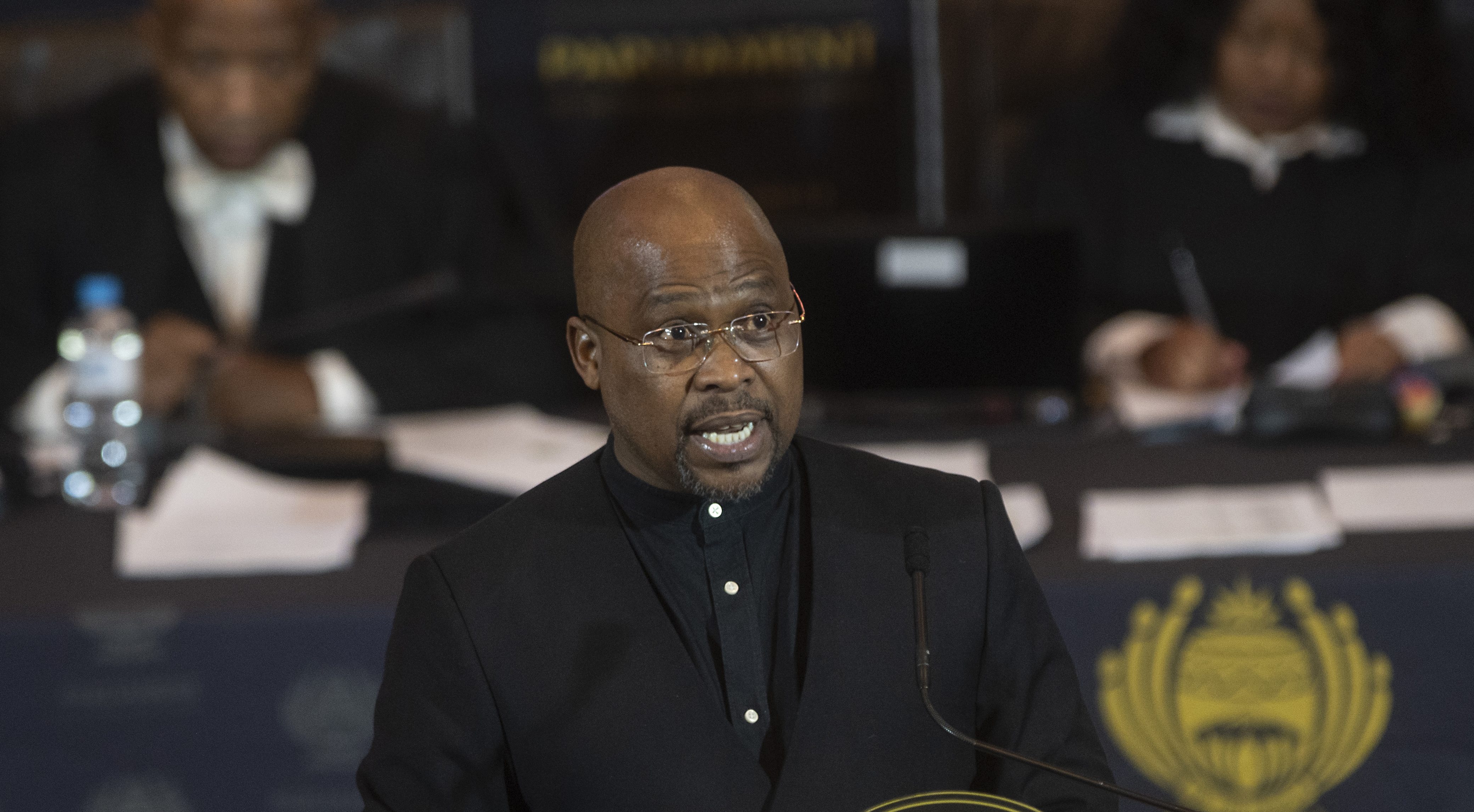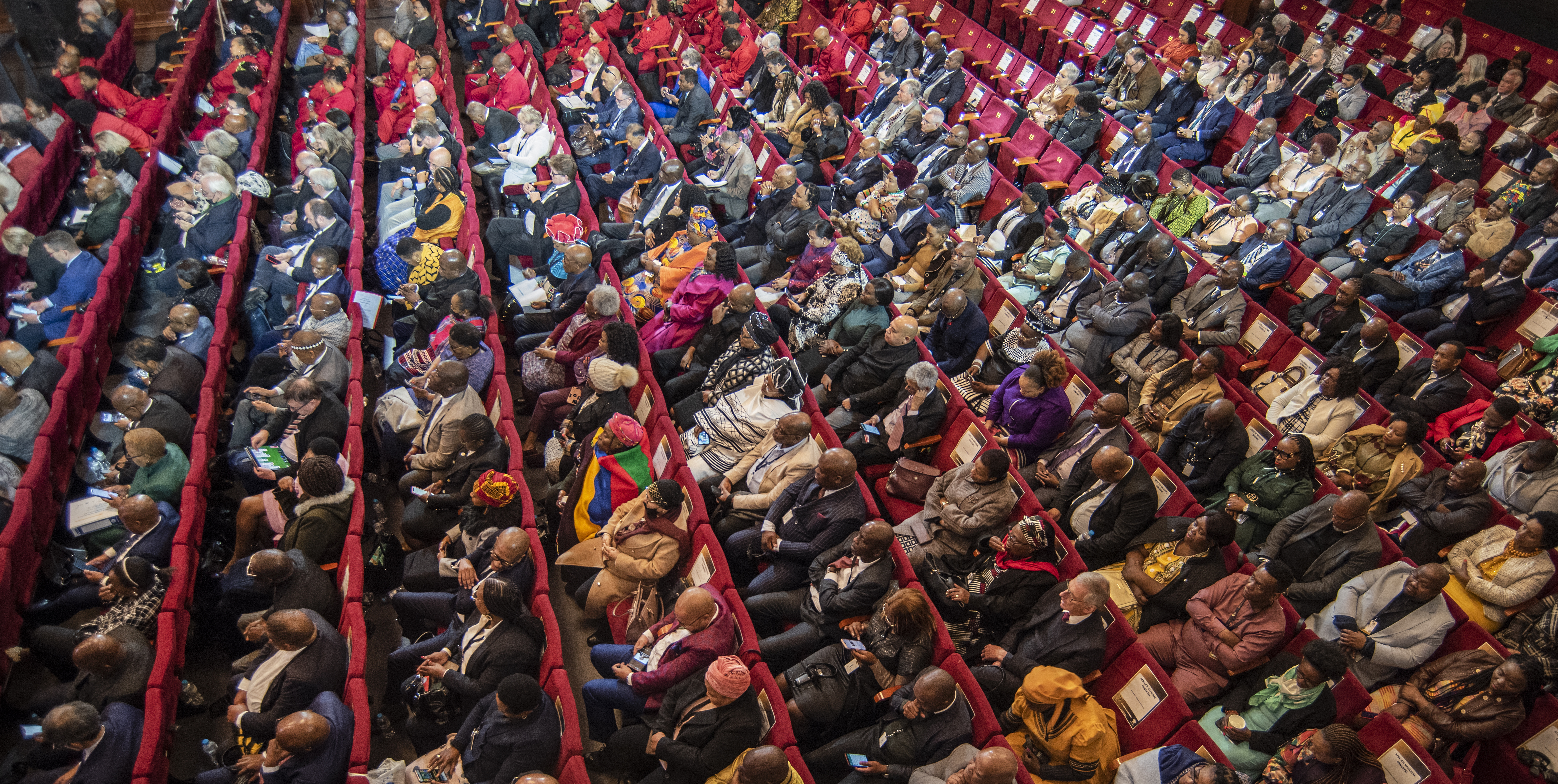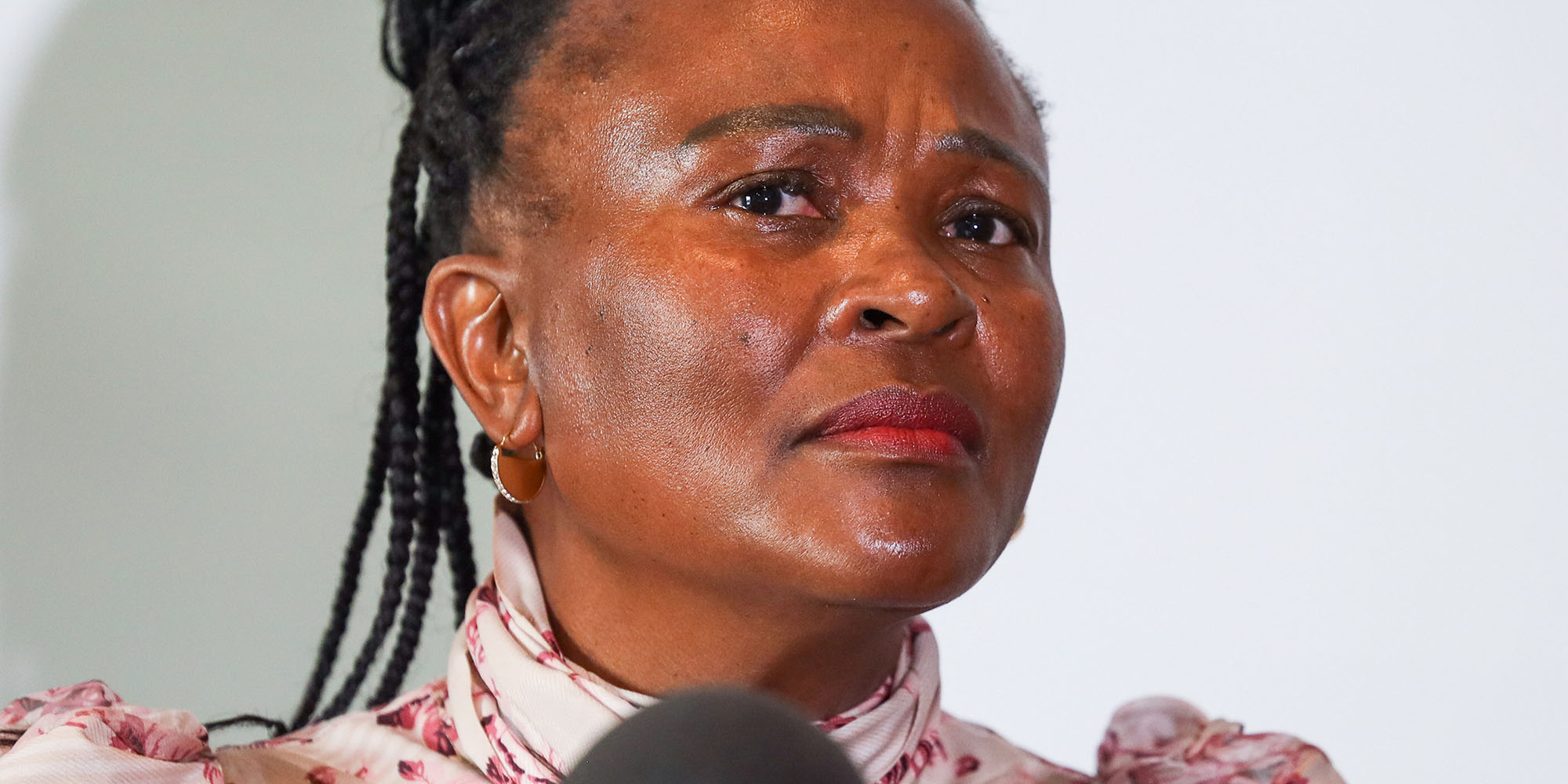It was a tame debate with significant cross-party agreement in the House on Monday ahead of the vote to remove from office the already suspended Public Protector Busisiwe Mkhwebane for misconduct and incompetence.
The vote came down to 318 for Mkhwebane’s removal from office — comfortably more than the constitutionally required two-thirds support, or 267 votes — and 43 against, with one abstention, from Cope leader Mosiuoa Lekota.
ANC speakers hammered home how Parliament’s Section 194 impeachment inquiry had kept an open mind and made up its mind only on the facts and evidence before them.
 ANC MP Qubudile Richard Dyantyi, Chairperson of the Section 194 Inquiry, during the National Assembly sitting on 11 September 2023 in Cape Town, South Africa. (Photo: Gallo Images / Brenton Geach)
ANC MP Qubudile Richard Dyantyi, Chairperson of the Section 194 Inquiry, during the National Assembly sitting on 11 September 2023 in Cape Town, South Africa. (Photo: Gallo Images / Brenton Geach)
“I have no doubt the committee has established, on the facts, that advocate Mkhwebane has indeed misconducted herself and is incompetent and is not fit for this esteemed office,” was how inquiry chairperson ANC MP Qubudile Dyantyi put it.
It was important to do so to nix any sympathies within the fractured governing party and for those once seen as close to Mkhwebane — like ANC MPs Mosebenzi Zwane, the ex-Free State agriculture MEC central to the Gupta-linked Vrede Dairy Farm scandal; and Bongani Bongo, the ex-state security minister — to stand up on Monday and publicly vocalise their “Yes” for Mkhwebane’s removal from office.
While numerous court judgments speak to Mkhwebane’s bias and loose understanding of legal and constitutional principles, several of her reports seemed to drop at key political moments, particularly in government party politicking. For example, the Bankorp/Absa apartheid-era bailout report, which proposed changing the South African Reserve Bank’s constitutional mandate, came in the middle of the ANC’s July 2017 policy conference that suggested nationalising the central bank.
In early 2020, the ANC seemed ambivalent even as the removal-from-office proceedings against Mkhwebane solidified; several party members publicly supported the Public Protector.
“There is a process in place. The ANC has not discussed where we stand, so we can’t give you an answer either way,” was how then deputy secretary-general Jessie Duarte put it after the pre-2020 State of the Nation Address parliamentary caucus.
Perhaps the governing party’s shift came over Mkhwebane’s decision to investigate President Cyril Ramaphosa over the Phala Phala forex saga. It was the second executive ethics probe — Ramaphosa successfully went to court to set aside the 2019 report into the funding of his CR17 campaign for party president.
Ramaphosa’s June 2022 suspension of Mkhwebane after she announced the Phala Phala investigation has been manipulated in South Africa’s noisy and neurotic politics and governing party factionalism. That’s even though the Constitutional Court in July 2023 upheld the presidential suspension and dismissed Mkhwebane’s legal challenge.
On Monday, the EFF, African Transformation Movement (ATM), United Democratic Movement (UDM) and Pan-Africanist Congress (PAC) reiterated Mkhwebane’s view of herself as a victim of the politically powerful that she’s presented in public commentary and throughout legal challenges. Al Jama-ah and the African Independent Congress (AIC) voted with them against impeachment.
 Members of Parliament during the National Assembly sitting at Cape Town City Hall on 11 September 2023 in Cape Town, South Africa. (Photo: Gallo Images / Brenton Geach)
Members of Parliament during the National Assembly sitting at Cape Town City Hall on 11 September 2023 in Cape Town, South Africa. (Photo: Gallo Images / Brenton Geach)
The proceedings were “a witch-hunt”, “grossly unfair”, a chase out of office and action against a “strong African woman”, according to these opposition parties.
“The uninformed majority seeks to railroad all of us to impeach a person not liked by the establishment,” said EFF MP Omphile Maotwe, reserving the party’s right to go to court.
“The governing ANC says, if you don’t toe the line the ANC will chase you out of office ... Who is next in this hateful reality?” asked ATM leader Vuyolwethu Zungula, while UDM leader Bantu Holomisa said that since the CR17 probe, “Mkhwebane did her job too well.”
But Freedom Front Plus Chief Whip Corné Mulder scotched the sentiment that Mkhwebane was “a vulnerable, poor victim of an evil conspiracy” for her rulings against the executive.
“It was a previous Public Protector who made very bad findings against the former executive and that Public Protector was not removed. Why? Because she was not incompetent.”
And he poured cold water on another leg of the Mkhwebane defence argument — a lack of legal support for Mkhwebane — pointing out she had the choice of lawyers for the inquiry and was represented by up to four.
“No one, but no one since 1994, was assisted in that way,” Mulder said.
Taxpayers forked out an estimated R30-million-plus for the inquiry and related court cases, as several MPs across the political divide pointed out in Monday’s debate. And all of Mkhwebane’s litigation, including defending various reports that were challenged by Ramaphosa, the South African Reserve Bank, Public Enterprises Minister Pravin Gordhan and others, cost an estimated R160-million, according to DA MP Annelie Lotriet.
Incompetence and misconduct were the grounds for the removal from office of Mkhwebane a month before the end of her seven-year non-renewable term as Public Protector. That has cost her a gratuity estimated at R10-million and benefits including a pension.
Read more in Daily Maverick: Mkhwebane’s R10m payday only months away while impeachment inquiry silently continues
But Mkhwebane’s stint in office should be a lesson in how incumbents are appointed to institutions that are key accountability and responsiveness tools in South Africa’s constitutional democracy.
Yet the proposed next Public Protector, the acting incumbent, Kholeka Gcaleka, is backed by the ANC with the IFP against other opposition parties, which disagreed about her suitability to revive the standing of the Office of the Public Protector. DA MP Glynnis Breytenbach has called for the reopening of the nomination and selection process.
It will be a tight vote for Gcaleka, understood to have been the ANC’s preferred candidate, to reach the required 60% support in the House, or 240 votes. The ANC, which has 230 seats, needs the IFP to bring its 14 votes and, as a vote buffer, also the support of several of the one- and two-seat parties like the AIC and Al Jama-ah.
As it turned out, last week’s programming committee decision to ditch Monday’s double billing — the vote on Mkhwebane’s impeachment and Gcaleka’s endorsement — over concerns of the “uncomfortability” of the City Hall venue proved a boon. The ANC would not have got the 240 votes needed, as only five IFP MPs were in the House following the weekend death of the party’s emeritus president, Mangosuthu Buthelezi.
A decision on the new Public Protector has been scheduled for 21 September.
Monday’s vote in the House has concluded the parliamentary process of the inquiry into Mkhwebane’s fitness to hold office. As it stands now, while Ramaphosa has to formally remove Mkhwebane, that is a non-negotiable in terms of section 194 of the Constitution. DM
Update: On 12 September, the day after the National Assembly vote, President Cyril Ramaphosa formally wrote to formally remove Busisiwe Mkhwebane as Public Protector. Section 194 of the Constitution says the President “must” do so after a vote in the House.




 Members of parliament during the National Assembly sitting to consider and debate the report of the Committee for Section 194 Enquiry at Cape Town City Hall on September 11, 2023 in Cape Town, South Africa. According to media reports, the Committee found Adv Mkhwebane guilty of misconduct and incompetence and recommended that the National Assembly remove her from the office of Public Protector as provided for in section 194 (1) (c) of the Constitution. (Photo by Gallo Images/Brenton Geach)
Members of parliament during the National Assembly sitting to consider and debate the report of the Committee for Section 194 Enquiry at Cape Town City Hall on September 11, 2023 in Cape Town, South Africa. According to media reports, the Committee found Adv Mkhwebane guilty of misconduct and incompetence and recommended that the National Assembly remove her from the office of Public Protector as provided for in section 194 (1) (c) of the Constitution. (Photo by Gallo Images/Brenton Geach) 